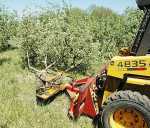Orchard out of business

Larry Kuhn stands beside a tractor filling his pipe and explaining the action going on behind him. Kuhn is the third generation of his family to live on the same farm of nearly 500 acres, one that recently was designated as a Century Farm, a farm that has been in the same family for at least 100 years.
"Grandma and Grandpa moved here from Illinois in about 1903," Kuhn said. "I'm the third generation to farm here. It was a big family back there and they ran out of land to farm there so they moved west."
Behind Kuhn a small bobcat-type tractor with a tree shear attachment is going up to apple trees and after only a few seconds the shear cuts the tree, it topples over and the bobcat moves on to another.

Terry Johnston is running the bobcat.
"This can handle a tree up to 10 inches," Johnston said. "Actually that's what the company says, I've handled trees a few inches bigger than that."
"This is custom work for me," Johnston said. "Although I have mixed feelings about it. It's kind of a shame, it's like losing a landmark."
"We're going to put hay in here, it's only nine acres or so and we put the rest in soybeans and the like," Kuhn said. "The orchard never really made us any money, it was just a way to work your tail off and not make any money. We still farm -- that's what pays the bills."
Kuhn said the University Extension service had helped the family when they planted the orchard in the 1970s and told them of the amount of work for the small payoff.
"The University Extension helped us enormously," Kuhn said. "They told us we'd work hard and not make much money. But they gave us a hand whenever we needed it."
One way the extension service helped was in giving the family a spraying schedule to keep the trees producing well.
"I've had people ask when we sprayed the trees," Kuhn said. "Well you don't just spray one time and that's it for the year, you have to spray several times for different pests. The extension service published a spraying schedule of when and what to spray."
One of the most difficult times of the year came when it was time to pick the apples.
"Most of the time it was all family working. There are three families that live on the farm," Kuhn said. "But during the harvest we'd hire two or three people to help."
Harvesting the apples isn't as easy as it might appear. The apples are delicate and even a little bruise could ruin more than one apple.
"You can't just drop an apple into a basket, you have to lay it in," Kuhn said. "If you drop it you not only bruise the apple you dropped, you also bruise one or two others. It's sort of like working with eggs."
Another reason the family is getting rid of the trees is the year around work and the fact that the generation working the farm is aging.
"You spray in the summer, several times, you pick in the fall and prune all winter long," Kuhn said. "There's 1,100 to 1,200 trees here and each one takes 30 or 40 minutes to prune, and that's with two or three people on each tree. Even if you could afford to hire someone to do it, how would they know what to do? You have to know where and when to prune."
Kuhn has no regrets about the orchard or the farm, he has a master's degree and has worked in the city, but he prefers life on the farm.
"I was working in Springfield for the government in 1966 and then Nixon was elected in 1968 and they cut the program," Kuhn said. "There I was with a master's degree and I ended up working at a department store. I was getting $3 an hour and lucky to get it. Times were hard then so I came back here."
"People here have been very good to us," Kuhn said. "I'm glad to help someone out when they need it because chances are they've done something for us when we were in a jam, that's just how it works."
Kuhn will continue to work the farm with his family but he questions how long a family farm can continue.
"Back when I started farming soybeans were $8 a bushel and a new tractor would run you $25,000," Kuhn said. "Now beans are $5 a bushel and tractors are running $80,000 to $90,000 and a combine can cost over $200,000."
Kuhn said the farm paid the bills but that's about it.
"Farming never paid," Kuhn said. "The accountant told me he had good news, the farm made $36 last year, the bad news was he couldn't find the $36."
Despite the hard work and the low pay the farming life is one he wants to pass on to the next generation.
"I'm just getting too old to be doing this," Kuhn said. "I just want to pass the farm on to the next generation with no debt."
